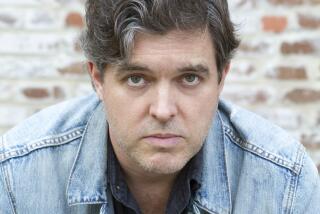Their Strength Was Not to Fight : YELLOW DOGS <i> by Donald Zochert (The Atlantic Monthly Press: $16.95; 216 pp.; 0-87113-254-0) </i>
At a time when so many exult in what they praise as a new flowering of patriotism marking America’s “resurrection” as a nation, it is timely that we be reminded that, the familiar Goldwater thesis to the contrary notwithstanding, an excess of such virtuous fervor has its perils. This fictionalized account of one of the sorriest episodes in our history, the shameful treatment of conscientious objectors to World War I, offers one such reminder.
The young protagonist, a model of clean-cut American youth, finds himself converted overnight into a target of scorn and verbal abuse--a “yellow dog”--by his neighbors and former friends. His offense is the decision not to “join up” in the great crusade against the Kaiser because of his unshakable conviction that war and killing are wrong. Nor is he the only one to suffer the penalty for daring to obey his conscience. His parents, until then well-liked and respected members of their rural Kansas community, soon find they, too, are scorned and ostracized. Before it is over, they will become victims of vicious retaliation at the hands of ordinary people they had known all their lives now caught up in the sweep of super-patriotic hysteria.
As for the culprit, he is dragooned into the Army against his will and when he persists in his refusal to “do his part” is incarcerated in military disciplinary barracks and ultimately sentenced to life imprisonment for attempting to assist a ‘Yellow Dogs’
fellow prisoner. There he, along with other “yellow dogs,” is subjected to a wide range of gross indignities and physical abuse.
There are flaws in Zochert’s telling, but the tale is based on actual history. The characterizations are one-dimensional--the “good guys” too unblemished in their nobility and virtue; the “bad guys” the epitome of narrow stupidity and sadist brutality. The solid front of hostility and disdain the family must endure at home is broken only by kindly acts of a timid musician hiding his German background, a mentally retarded boy, and the town prostitute.
The writing, too, distracts. Purple-tinged lyric descriptions of verdant Kansas fields and sunset skies give way abruptly to narration in simple declaratives, a combination suggesting a collaboration between Thomas Wolfe and Hemingway with neither anywhere near his prime. What the book lacks in style, however, is more than compensated for by its author’s clear intent to give due honor to unsung heroes of conscience 70 years after the fact.
We can take some pride in knowing the nation’s record was better during World War II. But not too much. Recognition and an opportunity to do alternate non-military service were granted religious conscientious objectors. Unfortunately, the promised “work of national importance” usually proved unimportant and the “civilian direction” was always subject to the orders of military officials at Selective Service headquarters.
Vietnam, an “unpopular” war, brought further improvements in the treatment of the far greater number who claimed conscientious objector status. Current plans for a future draft if (when?) it should come to pass promise to continue that favorable trend. There is reason to hope the cruel denial and persecution Zochert depicts is not likely ever to be repeated here.
Nevertheless, much remains to be done before our practices fully conform to our professed commitment to the democratic ideal. Our nation persists in dealing with conscientious objection as a privilege, not as a recognition of a basic human right. Not only that, the law restricts that “privilege” to those who trace their commitment to a foundation in religious belief, explicitly denying equal recognition to philosophical/ethical bases for the determination of right and wrong. And even for religious objectors, there is a de facto religious discrimination written into the law denying recognition to those who, following traditional teachings of their churches, make a distinction between “just” and “unjust” wars and limit their refusal to serving in the latter.
So while we take comfort from the gains made since men who chose to give priority to the dictates of conscience suffered derision and abuse as “yellow dogs,” public law and public opinion must be changed if we are to live up to the democratic values we profess.
President Kennedy looked forward to the day when the conscientious objector would be assured of the same measure of honor and respect as the soldier. If this book opens even a few minds and brings us closer to that day, its author will have earned our appreciation and gratitude.


